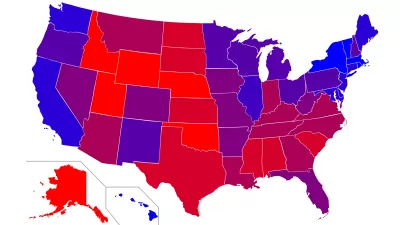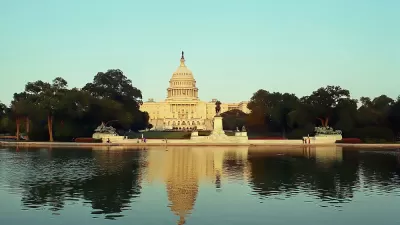When it comes to federal appropriations, urban areas in states dominated by rural Republicans are at a distinct disadvantage. In search of lobbying power, metros in affected states are banding together.

Alan Greenblatt makes the case that cities are hampered in states where legislators tend Republican: "[...] partisan divisions have become more aligned with regional ones. Most urban delegations are dominated by Democrats, while most rural and many suburban representatives are Republican."
Rural and suburban Congresspeople can get reelected by advancing an anti-urban agenda. "But the lack of urban voices within many majorities means cities are bound to lose out on some appropriations. 'When the urban economies are responsible for 70 percent of the state's revenue, you would think we would get more respect, but we don't,' says Oklahoma City Mayor Mick Cornett. 'In our state, it seems like the easiest way for a rural legislator to score points at home is to take a shot at Oklahoma City.'"
Strategies have arisen to reverse what might be called a self-destructive tendency. Greenblatt writes, "In response to this trend, major metropolitan areas in some states are forming alliances, hoping to speak collectively with a more powerful voice. In Kentucky, Louisville has joined with other sizable cities to form a 'metro alliance for growth.'" Solutions proposed include local tax measures and other decentralized means of raising money, independent of federal or even state control.
FULL STORY: In Red States, Cities Can’t Win

Planetizen Federal Action Tracker
A weekly monitor of how Trump’s orders and actions are impacting planners and planning in America.

Map: Where Senate Republicans Want to Sell Your Public Lands
For public land advocates, the Senate Republicans’ proposal to sell millions of acres of public land in the West is “the biggest fight of their careers.”

Restaurant Patios Were a Pandemic Win — Why Were They so Hard to Keep?
Social distancing requirements and changes in travel patterns prompted cities to pilot new uses for street and sidewalk space. Then it got complicated.

Platform Pilsner: Vancouver Transit Agency Releases... a Beer?
TransLink will receive a portion of every sale of the four-pack.

Toronto Weighs Cheaper Transit, Parking Hikes for Major Events
Special event rates would take effect during large festivals, sports games and concerts to ‘discourage driving, manage congestion and free up space for transit.”

Berlin to Consider Car-Free Zone Larger Than Manhattan
The area bound by the 22-mile Ringbahn would still allow 12 uses of a private automobile per year per person, and several other exemptions.
Urban Design for Planners 1: Software Tools
This six-course series explores essential urban design concepts using open source software and equips planners with the tools they need to participate fully in the urban design process.
Planning for Universal Design
Learn the tools for implementing Universal Design in planning regulations.
Heyer Gruel & Associates PA
JM Goldson LLC
Custer County Colorado
City of Camden Redevelopment Agency
City of Astoria
Transportation Research & Education Center (TREC) at Portland State University
Camden Redevelopment Agency
City of Claremont
Municipality of Princeton (NJ)




























